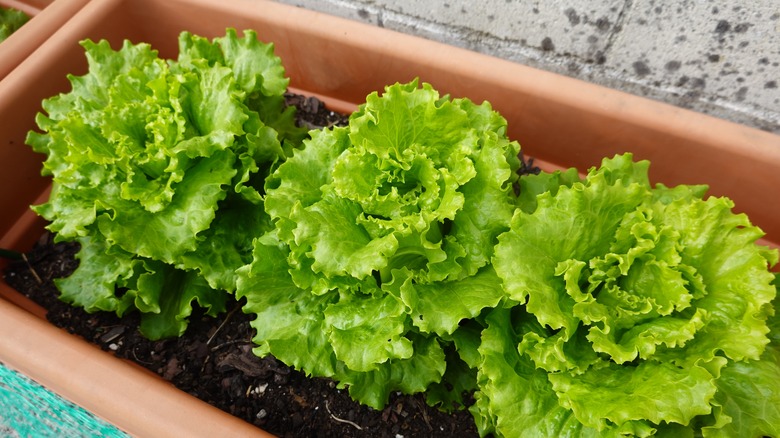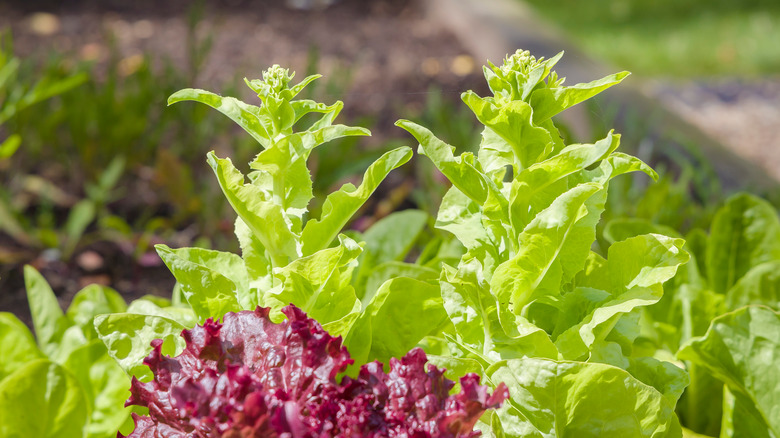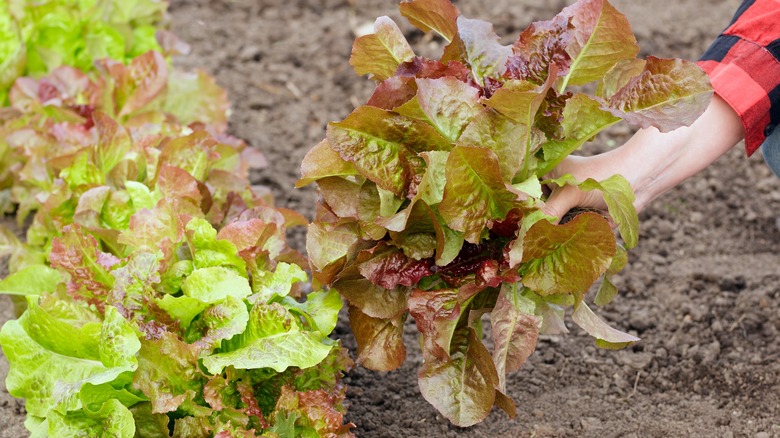Tips For Growing Crispy Lettuce In Containers All Summer Long
Some vegetables are perfect for container gardens. With its shallow roots, lettuce is ideal for growing in shallow planters. Lettuce thrives in cooler months but can't tolerate a hard freeze. Luckily, planters can be easily moved and sheltered to prevent damage during extreme weather scenarios. To start your lettuce, sow seeds shallowly in a well-draining, slightly sandy soil mix. Include perlite in the soil to improve drainage, and add compost for nutrients.
There are some tips to know when harvesting lettuce for continuous plant growth. First, be sure you choose the right variety for the approach you want to take. One popular technique is to "cut and come again." This works best for non-heading lettuce varieties and involves cutting the outer leaves of a lettuce plant. Then, you allow the inner leaves to continue growing. Another method is to gather a bunch of lettuce leaves at their base, just as you would hair for a ponytail. Then, cut the tops off, leaving a few inches protruding from the soil. The lettuce plant will recover from the harvest and put forth new leaves. Both approaches allow you to stretch a plant's lifespan and increase your yields; however, know that regrowth can take a week or two. You can also ensure a steady supply of lettuce by sowing new seeds every few weeks.
How to prevent your lettuce from bolting
Being a cool-weather crop, lettuce is quite sensitive to rising temperatures. Warmer days signal to the plant that it's time to reproduce. When that happens, lettuce sends up a flower spike and goes to seed. This is called bolting. Bolted lettuce stops putting forth new leaves and acquires a bitter taste that's not enjoyable to eat. However, you can take steps to prevent bolting and prolong the harvest time for this crop.
To prevent lettuce from bolting, the trick is to keep the air and soil temperatures cool. This starts by finding the right location for your plants. Situate them in a partially shaded area. For container gardeners, this is quite easy to do: Simply bring your planters onto a porch or under a patio awning to provide relief from the sun. Or, you can situate lettuce under taller plants that will cast a shadow over your greens. Keeping your container gardens well-watered is also key to delaying bolting. Also, be sure not to crowd your planter with too many lettuce plants. When plants are forced to compete for nutrients, they can go to seed faster. Minimizing other stressors, such as disease or pest infestations, will also help delay bolting. You can bring predatory insects to the garden by planting pollinator plants or trap crops such as nasturtium. For disease control, never reuse soil that has been used to grow other plants that were affected by fungal diseases or pests.
Choose the right varieties
One of the best things you can do to prevent lettuce from bolting is to plant at the right time of year. For most climates, that means early spring and autumn. However, there's an exception to this rule: You can opt for varieties of lettuce that are more tolerant of warmer weather. For best results, pay close attention to growing directions, particularly information about USDA growing zones and ideal temperature ranges.
Romaine (Lactuca s. var. longifolia) or lamb's lettuce (Lactuca s. var. crispa) and Ezrilla are some heat-tolerant varieties of lettuce. According to a study by Colorado State University, Batavian and butter lettuce varieties are slower to bolt as well. Seed companies are always developing new hybrids, selecting for things like heat tolerance and bolt resistance and looking to bring hardy heirloom lettuce varieties back to the market. (A word to the wary: Plant hybrids are not the same as GMOs.) When selecting vegetable seeds for specific growing conditions, look for seed companies that can offer thorough information about which varieties will thrive in your yard or type of container. While you're shopping, you may even find other vegetable seeds specifically designed for container gardens.


